|
 |
 |
| |
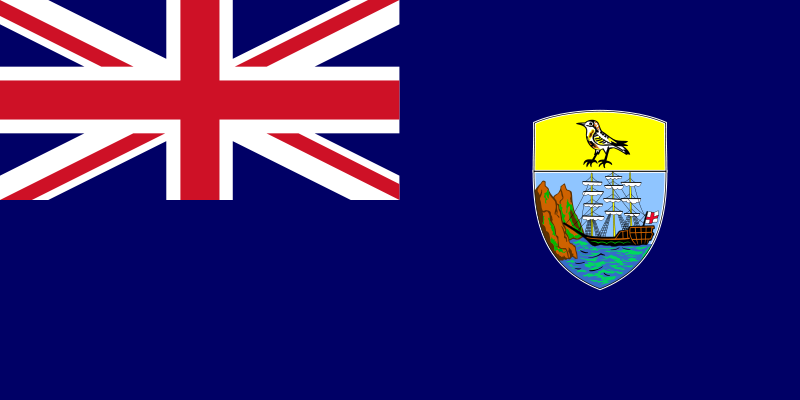 |
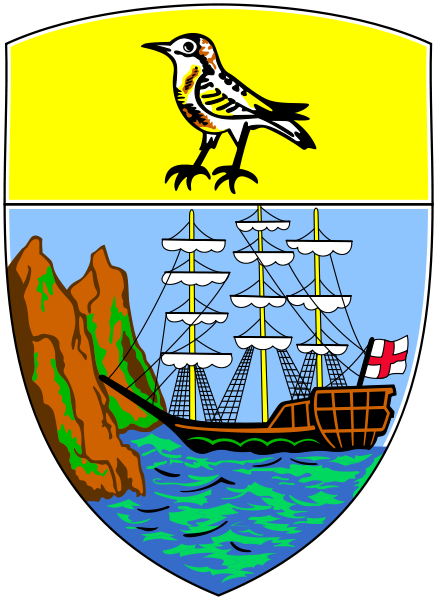 |
| |
21 May 1502 Discovered and claimed for Portugal by Admiral
João da Nova.
30 Jul 1503 Re-discovered.
1513 - 1545
Fernão Lopez (Fernando Lopez), a Portuguese prisoner
on his way home, marooned himself on the Island.
08 Jun 1588 Claimed for England by Thomas Cavendish.
15 Apr 1633 - 1651 Claimed
by the Dutch, but unsettled.
1657 (English) East India Company granted a charter to
settle St. Helena by Oliver Cromwell.
05 May 1659 England takes possession of St. Helena
(under East India Company rule).
01 Jan 1673 - 15 May 1673 Dutch occupation.
16 Dec 1673 East India Company granted proprietary possession of
St. Helena.
22 Oct 1815 Ascension annexed by Britain (a dependency of
St. Helena from 1922).
15 Oct 1815 - 05 May 1821 Deposed Emperor Napoléon I exiled on St.
Helena.
14 Aug 1816 Tristan da Cunha annexed by Britain.
28 Aug 1833 British crown of colony of Saint Helena
(effective 22 Apr 1834).
12 Sep 1922 Ascension made a dependency of St. Helena.
12 Jan 1938 Tristan da Cuhna, Gough (28 Mar), Inaccessible and
Nightingale islands made a dependency of St. Helena.
1945 Saint Helena and Dependencies
25 May 2002 Voters reject adoption of ministerial form of
government in referendum 52.6% to 47.2%.
01 Sep 2009 Saint Helena, Ascension and Tristan da Cunha.
Constitution Order |
|
|
|
 |
| |
Saint Helena,
named after Saint Helena of Constantinople, is an island of volcanic origin
in the South Atlantic Ocean. It is part of the British overseas territory of
Saint Helena, Ascension and Tristan da Cunha which also includes Ascension
Island and the islands of Tristan da Cunha. Saint Helena measures about 16
by 8 kilometres (10 by 5 mi). The island was uninhabited when discovered by
the Portuguese in 1502. It is one of the most isolated islands in the world.
For centuries, it was an important stopover for ships sailing to Europe from
Asia and South Africa. The British also used the island as a place of exile,
most notably for Napoleon I, Dinuzulu kaCetshwayo and more than 5,000 Boer
prisoners. Saint Helena is Britain's second oldest remaining colony (now
termed overseas territory), after Bermuda.
Capital: Jamestown
(Fort St. John 1659-1665). Motto:
"Loyal and Unshakeable".
The British Nationality Act 1981 reclassified Saint Helena and the other
Crown colonies as British Dependent Territories. The islanders lost their
status as "Citizens of the United Kingdom and Colonies" and thus lost the
right of abode in Britain. For the next 20 years, many could find only
low-paid work with the island government, and the only available overseas
employment was on the Falkland Islands and Ascension Island. The Development
and Economic Planning Department, which still operates, was formed in 1988
to contribute to raising the living standards of the people of Saint Helena.
In 1989, Prince Andrew launched the replacement RMS St Helena to serve the
island; the vessel was specially built for the Cardiff–Cape Town route and
features a mixed cargo/passenger layout. The Saint Helena Constitution took
effect in 1989 and provided that the island would be governed by a Governor
and Commander-in-Chief, and an elected Executive and Legislative Council. In
2002, the British Overseas Territories Act restored full passports to the
islanders, and renamed the Dependent Territories (including Saint Helena)
the British Overseas Territories. In 2009, Saint Helena and its two
territories received equal status under a new constitution, and the British
Overseas Territory was renamed Saint Helena, Ascension and Tristan da Cunha.
In 2011, the UK government announced it would invest £200m in an airport on
the island, which would benefit the British government in the long term, as
£26m a year in aid would no longer be required. It is expected the airport
will be up and running by 2015. The aims of the airport are to reduce prices
of transportation of goods, increase tourism by more than 50 fold and to
create new job opportunities. Flying to the island will only be available
from South Africa, according to initial plans. |
| |
| |
|
Monetary standard:
Saint Helenian Pound (SHP) = 100 pence. |
| The Saint
Helena pound (also called simply "pound") is the currency of the Atlantic
islands of Saint Helena and Ascension, which are constituents of the British
overseas territory of Saint Helena, Ascension and Tristan da Cunha. It is
fixed at parity with the pound sterling and is subdivided into 100 pence.
Tristan da Cunha, the third part of the territory, uses Pound sterling
rather than the St Helena pound. However there are occasionally
commemorative coins minted for the island. Initially, the British Pound
Sterling circulated on Saint Helena, with the pound subdivided into 20
shillings, and each shilling into 12 pence. The first coins were first
introduced in 1821, in which copper Half Pennies were issued for Saint
Helena by the East India Trading Company and these were used for a majority
of the Company's influence in the area. Prior to February 1961, the South
African pound, which was then equal in value to sterling, was also accepted
on the island, but this stopped with the introduction of the new decimal
South African Rand, such that one rand was worth only ten shillings
sterling. In 1976, the St. Helena government began issuing new, decimal
denominated banknotes for use on the island, with the introduction of
circulation coins intended for use on St. Helena as well as Ascension
beginning in 1984 (1p, 2p, 5p, 10p, 50p and 1 Pound). Beside commemorative
coins issued on St. Helena and Ascension (from 1986), circulated coins are
also reported to be produced in 1991, 1997, 1998, 2002, 2003 and 2006. Prior to 1984, both Saint Helena (from 1973) and
Ascension Island (from 1978) had issued non circulating commemorative coins
separately but officially used British circulation coins. The St. Helena issued
banknotes circulated alongside British coins and banknotes. |
| |
|
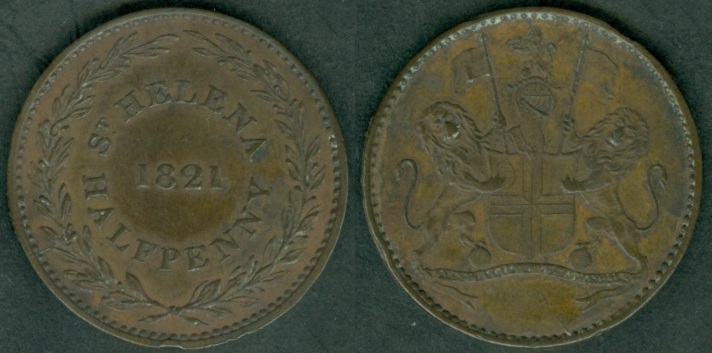 |
| KM#A4 Half Penny (1/200 Pound). Year:
1821. Weight:
9.53g [9.40g]. Metal:
Copper. Edge:
Plain. Diameter:
29.00 mm.
Alignment:
Coin. Mint:
N/A.
Obverse:
Date in the center. "ST. HELENA" written above and "HALF PENNY"
below the Date. Wreath around the border.
Reverse: East India Company Emblem in the
center with "AUSP: REGIS & SENAT ANGLIÆ" (Translation:
By the authority of the King and Parliament of England) written on the banner.
Mintage:
N/A.
Minted Years: One year
type. Note:
This coin also exits in Proof as KM#4a in Bronze and as KM#4b in
Gilt Bronze with same
weight and diameter. |
|
| |
|
Commemorative coins |
| |
|
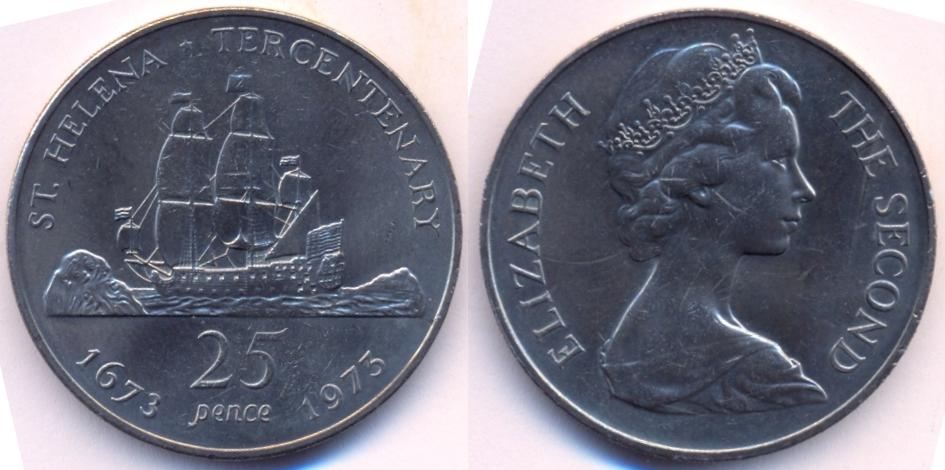 |
|
KM#5 25 pence. Year:
ND (1973). Weight:
28.14g [28.28g]. Metal:
Copper-Nickel. Edge:
Reeded. Diameter:
38.50 mm.
Alignment:
Medal. Mint:
British Royal Mint.
Obverse: "ST. HELENA * TERCENTENARY" written on
the upper part. Sailing ship in the center. Value "25 pence"
written below the sailing ship. Year "1673" written on the left side
of the value and "1973" on the right side.
Reverse:
Queen Elizabeth II portrait facing right in the center with "ELIZABETH" written
on the left side clockwise and "THE SECOND" on the right side
clockwise.
Mintage:
100,000.
Minted Years: One year
type. Subject:
300 years of British rule. Engravers:
Arnold Machin (Elizabeth II's side) and
Leslie Durbin (value side). Note:
This coin also exits in 0.9250 silver as KM#5a (Mintage: 10,000) with same
weight and diameter. Since 1657, the
British East India Company had received the rights to govern the
island. But in early 1673, the Dutch attacked Saint Helena and
occupied it for a few months. The British East India Company retook
the island in May and a new Charter was given by Charles II of
England that granted the island free title. So 1673 is neither
discovery nor anniversary of British presence on the island, but a
milestone in its history and in the Dutch-British competition for
trade. |
|
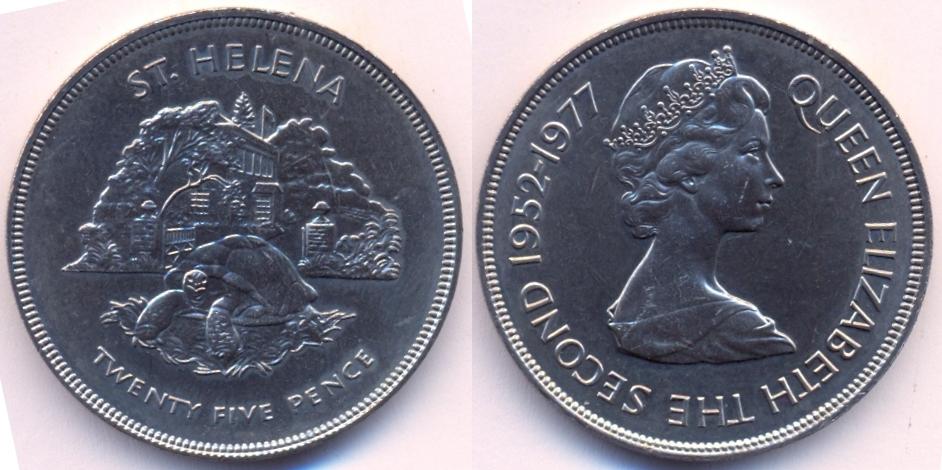 |
|
KM#6 25 pence. Year:
ND (1977). Weight:
28.37g [28.28g]. Metal:
Copper-Nickel. Edge:
Reeded. Diameter:
38.50 mm.
Alignment:
Medal. Mint:
British Royal Mint.
Obverse: "ST. HELENA" written at the top.
Aldabra giant tortoise in front of a government building, which is
surrounded by tress and mountains. Value "TWENTY FIVE PENCE"
written at the bottom.
Reverse:
Queen Elizabeth II portrait facing right in the center with "QUEEN
ELIZABETH THE SECOND 1952-1977" written around her.
Mintage:
100,000.
Minted Years: One year
type. Subject:
25th Anniversary (silver jubilee) of the Coronation of Queen
Elizabeth II.
Engravers:
Arnold Machin (Queen Elizabeth II portrait side). Note:
This coin also exits in 0.9250 silver as KM#6a (Mintage: 25,000) with same
weight and diameter. |
|
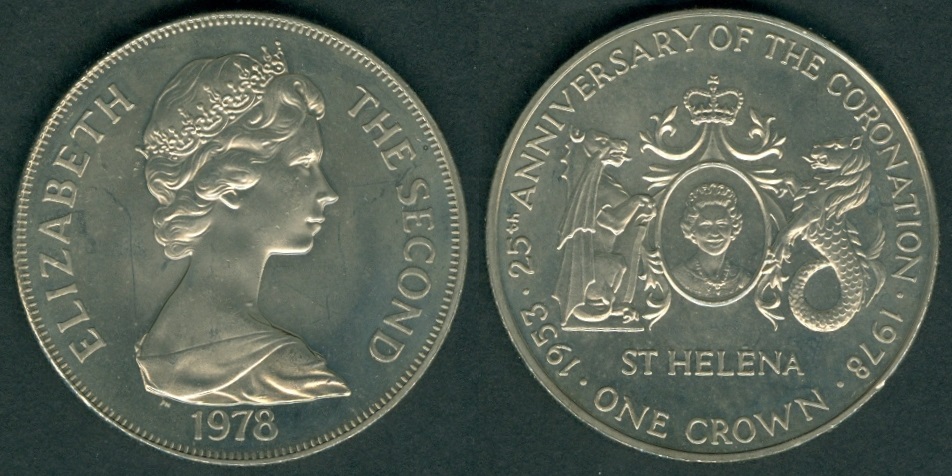 |
|
KM#7 Crown (25 pence). Year:
1978. Weight:
28.43g [28.47g]. Metal:
Copper-Nickel. Edge:
Reeded. Diameter:
38.50 mm.
Alignment:
Medal. Mint:
Pobjoy Mint.
Obverse:
Queen Elizabeth II portrait facing right in the center. "ELIZABETH"
written at the left side clockwise and "THE SECOND" written at the
left side clockwise. Date "1978" written
at the bottom.
Reverse:
1953·25th ANNIVERSARY OF THE CORONATION·1978 written around the
Crowned portrait of Queen Elizabeth II with supporters in the
center. "ST. HELENA" written above the Value "ONE CROWN"
at the bottom.
Mintage:
N.A.
Minted Years: One year
type. Subject:
25th Anniversary of the Coronation of Queen Elizabeth II.
Engravers:
Arnold Machin (Date side). Note:
This coin also exits in 0.9250 silver as KM#7a (Mintage: 70,000 +
25,000 Proof)
with same weight and diameter.
The coronation of Queen Elizabeth II as monarch of the United
Kingdom, Canada, Australia, New Zealand, South Africa, Pakistan and
Ceylon took place on 02 June 1953, at Westminster Abbey. Elizabeth
ascended the throne at the age of 25, upon the death of her father,
King George VI, on 06 February 1952, and was proclaimed queen by her
various privy and executive councils shortly afterwards. The
coronation took place more than a year later because of the
tradition that holding such a festival is inappropriate during the
period of mourning that follows the death of a monarch and also on
account of the need to make preparations for the ceremony. |
|
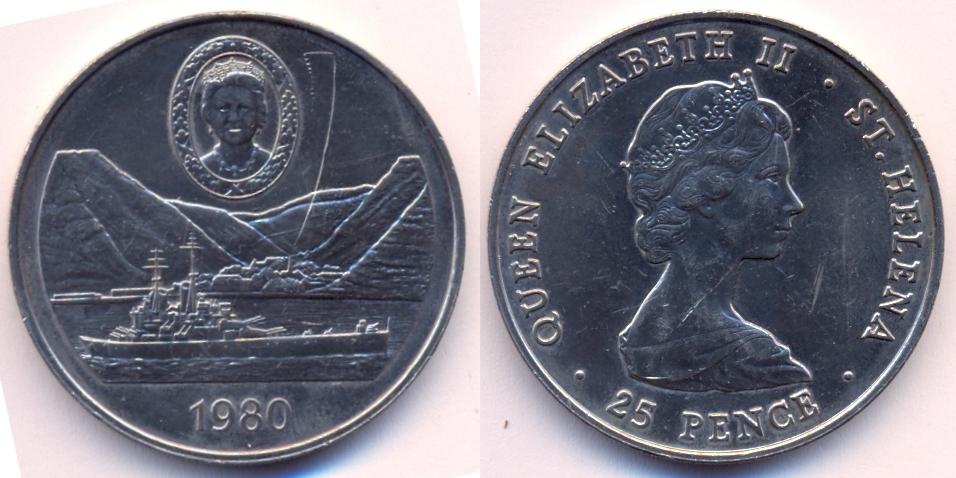 |
|
KM#8 25 pence. Year:
1980. Weight:
28.30g [28.28g]. Metal:
Copper-Nickel. Edge:
Reeded. Diameter:
38.50 mm.
Alignment:
Medal. Mint:
British Royal Mint.
Obverse: Queen Elizabeth, The Queen's Mother
portrait in oval picture frame at the top. War ship with Jamestown
in the background. "1980" year at the bottom.
Reverse:
Queen Elizabeth II portrait facing right in the center with "QUEEN
ELIZABETH II · ST. HELENA" written around her. Value "· 25 PENCE
·"
at the bottom.
Mintage:
100,000.
Minted Years: One year
type.
Engravers:
Arnold Machin (Queen Elizabeth II portrait side). Note:
This coin also exits in 0.9250 silver as KM#8a (Mintage: 25,000)
with same weight and diameter. Elizabeth Angela Marguerite
Bowes-Lyon (04 August 1900 – 30 March 2002) was the wife of King
George VI and the mother of Queen Elizabeth II. She was queen
consort of the United Kingdom from her husband's accession in 1936
until his death in 1952, after which she was known as Queen
Elizabeth The Queen Mother, to avoid confusion
with her daughter. |
|
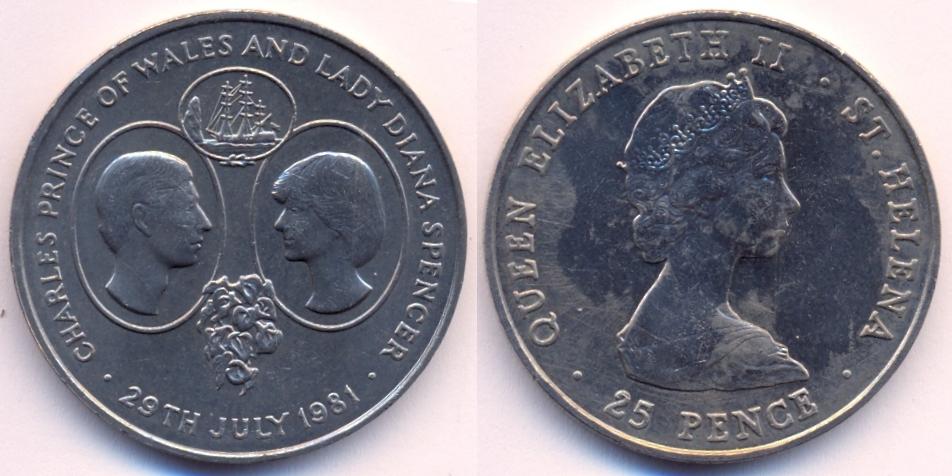 |
|
KM#9 25 pence. Year:
ND (1981). Weight:
28.26g [28.28g]. Metal:
Copper-Nickel. Edge:
Reeded. Diameter:
38.50 mm.
Alignment:
Medal. Mint:
British Royal Mint.
Obverse: Prince Charles picture on the left
side in an oval with Lady Diana's picture on the right side in an
oval. Both facing each other. Above their pictures, part Saint
Helena's Coat and Arms in an oval. Flower joining their pictures
below. "CHARLES PRINCE OF WALES AND LADY DIANA SPENCER" written
around them. Date of their marriage "· 29TH JULY 1981 ·" at the bottom.
Reverse:
Queen Elizabeth II portrait facing right in the center with "QUEEN
ELIZABETH II . ST. HELENA" written around her. Value "25 PENCE"
at the bottom.
Mintage:
50,000.
Minted Years: One year
type.
Engravers:
Arnold Machin (Queen Elizabeth II portrait side). Note:
This coin also exits in 0.9250 silver as KM#9a (Mintage: 30,000) with same
weight and diameter. |
|
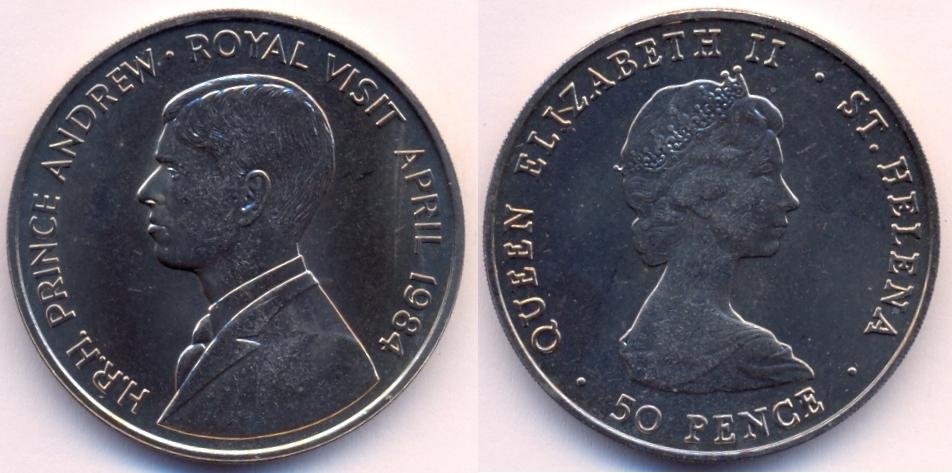 |
|
KM#13 50 pence. Year:
ND (1984). Weight:
28.18g [28.28g]. Metal:
Copper-Nickel. Edge:
Reeded. Diameter:
38.50 mm.
Alignment:
Medal. Mint:
British Royal Mint.
Obverse: Prince Andrew portrait in the center,
facing left. "H.R.H. PRINCE ANDREW · ROYAL VISIT APRIL 1984" written
around him.
Reverse:
Queen Elizabeth II portrait facing right in the center with "QUEEN
ELIZABETH II · ST. HELENA" written around her. Value "· 50 PENCE
·"
at the bottom.
Mintage:
125,000.
Minted Years: One year
type.
Engravers:
Arnold Machin (Queen Elizabeth II portrait side). Note:
This coin also exits in 0.9250 silver as KM#13a (Mintage: 5,000) with same
weight and diameter. |
|
| |
|
Circulating coins of
Saint Helena & Ascension |
| |
|
1984 |
| Engravers:
Michael Hibbit (value side) and Arnold Machin (Queen Elizabeth
side). |
| |
|
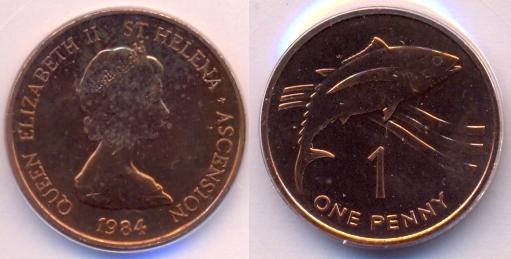 |
KM#1 1 penny. Year:
1984. Weight:
3.56g. Metal:
Bronze. Edge:
Plain. Diameter:
20.32 mm.
Alignment:
Medal. Mint:
British Royal Mint.
Obverse:
Queen Elizabeth II portrait facing right in the center. "QUEEN
ELIZABETH II ST. HELENA + ASCENSION" written around her. Year at the
bottom.
Reverse:
Yellow Fin Tuna in the center. Value "1" and "ONE PENNY" at the
bottom.
Mintage:
N/A.
Minted Years: One year
type. |
| Note:
Yellow Fin Tuna, which is abounds around the
island and is the most popular eating fish. Many weight as 200-240
Pounds a piece. |
|
|
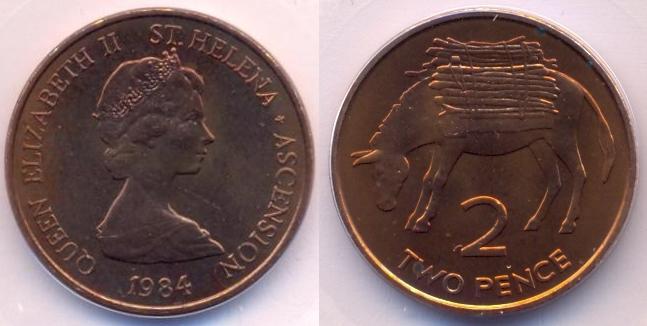 |
KM#2 2 pence. Year:
1984. Weight:
7.13g. Metal:
Bronze. Edge:
Plain. Diameter:
25.91 mm.
Alignment:
Medal. Mint:
British Royal Mint.
Obverse:
Queen Elizabeth II portrait facing right in the center. "QUEEN
ELIZABETH II ST. HELENA + ASCENSION" written around her. Year at the
bottom.
Reverse:
Donkey carrying firewood in the center. Value "2" and "TWO PENCE" at
the bottom.
Mintage:
N/A.
Minted Years: One year
type. |
| Note:
The Donkey has played an important role in the
economy of St. Helena. Today they are still used by many to carry
firewood and fodder in the country areas. |
|
|
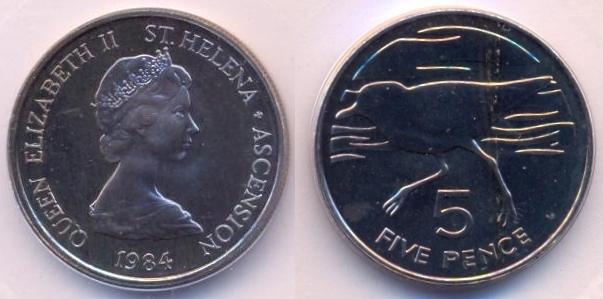 |
KM#3 5 pence. Year:
1984. Weight:
5.66g. Metal:
Copper-Nickel. Edge:
Reeded. Diameter:
23.60 mm.
Alignment:
Medal. Mint:
British Royal Mint.
Obverse:
Queen Elizabeth II portrait facing right in the center. "QUEEN
ELIZABETH II ST. HELENA + ASCENSION" written around her. Year at the
bottom.
Reverse:
Wirebird running left in the center. Value "5" and "FIVE PENCE" at
the bottom.
Mintage:
N/A.
Minted Years: One year
type. |
| Note:
The Wirebird has been in St. Helena since it
was first discovered. This distinctive bird is indigenous to St.
Helena. |
|
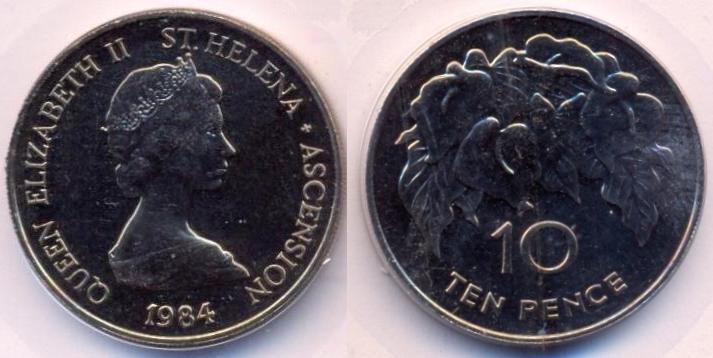 |
KM#4 10 pence. Year:
1984. Weight:
11.31g. Metal:
Copper-Nickel. Edge:
Reeded. Diameter:
28.50 mm.
Alignment:
Medal. Mint:
British Royal Mint.
Obverse:
Queen Elizabeth II portrait facing right in the center. "QUEEN
ELIZABETH II ST. HELENA + ASCENSION" written around her. Year at the
bottom.
Reverse:
Arum Lily in the center. Value "10" and "TEN PENCE" at the bottom.
Mintage:
N/A.
Minted Years: One year
type. |
| Note:
The Arum Lily which is St. Helena national
emblem grows wild and is a common sight, known locally as Yam. |
|
|
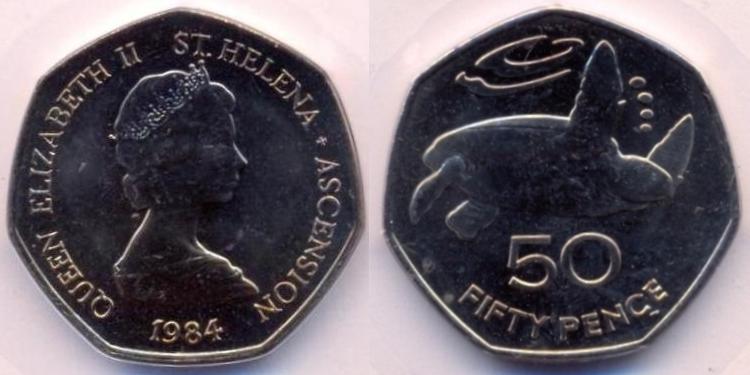 |
| KM#5 50 pence. Year:
1984. Weight:
13.50g. Metal:
Copper-Nickel. Edge:
Plain. Diameter:
30.00 mm; 7-sided (heptagonal).
Alignment:
Medal. Mint:
British Royal Mint.
Obverse:
Queen Elizabeth II portrait facing right in the center. "QUEEN
ELIZABETH II ST. HELENA + ASCENSION" written around her. Year at the
bottom.
Reverse: Green Turtle swimming towards right in
the center. Value "50"
and "FIFTY PENCE" at the bottom.
Mintage:
N/A.
Minted Years: One year
type. Note:
For thousands of years, the Green Turtle has
traveled to Ascension Island all the way from South American coast
to lay its eggs. It is one of nature's mysteries, how the turtle is
able to travel so far to find the same beach year after year. |
|
|
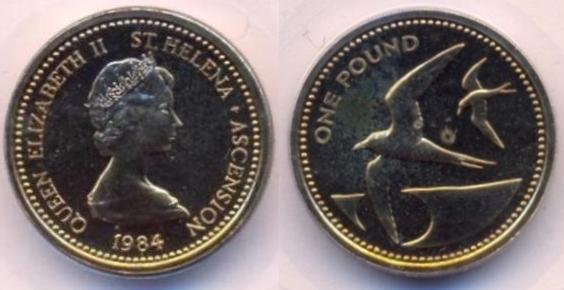 |
KM#6 1 Pound. Year:
1984. Weight:
9.50g. Metal:
Nickel-Brass. Edge:
Reeded with incused lettering "COLONY OF ST.
HELENA".
Diameter:
22.50 mm.
Alignment:
Medal. Mint:
British Royal Mint.
Obverse:
Queen Elizabeth II portrait facing right in the center. "QUEEN
ELIZABETH II ST. HELENA + ASCENSION" written around her. Year at the
bottom.
Reverse: Two Wideawake (Sooty Tern) flying left in the
center. Value "ONE POUND" at the top left side.
Mintage:
N/A.
Minted Years: One year
type. |
| My coin has edge readable when Date (Queen Elizabeth
II) side is on the top. Note:
Wideawake (sooty Tern) is called because of
the sound of its call. The airfield on Ascension, which is important
in the Falklands War, was named after this bird. |
|
| |
|
1991 |
| |
|
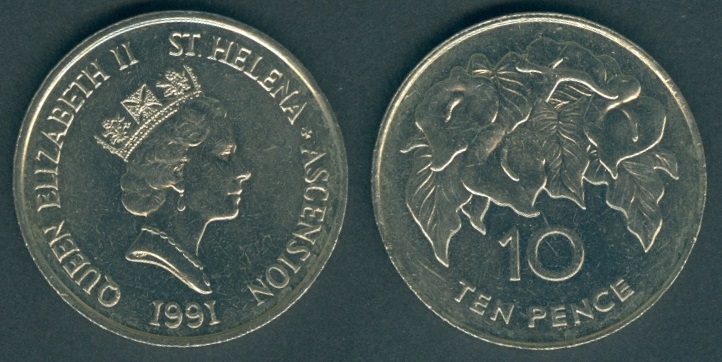 |
KM#15 10 pence. Year:
1991. Weight:
11.13g. Metal:
Copper-Nickel. Edge:
Reeded. Diameter:
28.50 mm.
Alignment:
Medal. Mint:
British Royal Mint.
Obverse:
Queen Elizabeth II portrait facing right in the center. "QUEEN
ELIZABETH II ST. HELENA + ASCENSION" written around her. Year at the
bottom.
Reverse:
Arum Lily in the center. Value "10" and "TEN PENCE" at the bottom.
Mintage:
N/A.
Minted Years: One year
type. |
|
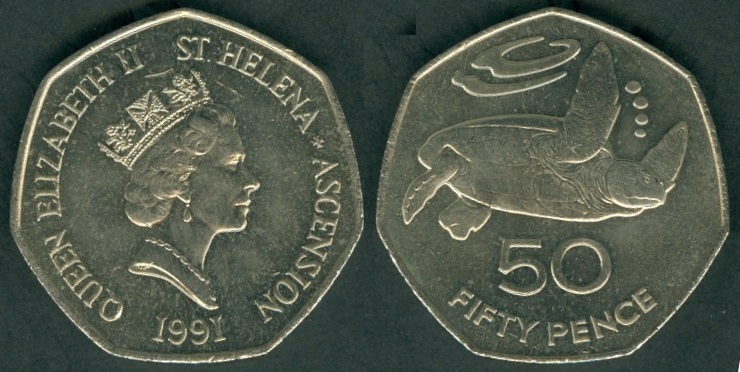 |
| KM#16 50 pence. Year:
1991. Weight:
13.53g [13.50g]. Metal:
Copper-Nickel. Edge:
Plain. Diameter:
30.00 mm; 7-sided (heptagonal).
Alignment:
Medal. Mint:
British Royal Mint.
Obverse:
Queen Elizabeth II portrait facing right in the center. "QUEEN
ELIZABETH II ST. HELENA + ASCENSION" written around her. Year at the
bottom.
Reverse: Green Turtle swimming towards right in the center. Value "50"
and "FIFTY PENCE" at the bottom.
Mintage:
N/A.
Minted Years: One year
type.
Engravers:
Michael Hibbit (value side) and Raphael David Maklouf (Queen Elizabeth
side). |
|
 |
KM#17 1 Pound. Year:
1991. Weight:
9.47g [9.50g]. Metal:
Nickel-Brass. Edge:
Reeded with incused lettering "COLONY OF ST.
HELENA".
Diameter:
22.50 mm.
Alignment:
Medal. Mint:
British Royal Mint.
Obverse:
Queen Elizabeth II portrait facing right in the center. "QUEEN
ELIZABETH II ST. HELENA + ASCENSION" written around her. Year at the
bottom. |
|
Reverse: Two Wideawake (Sooty Tern) flying left in the
center. Value "ONE POUND" at the top left side.
Mintage:
N/A.
Minted Years: 1991, 2003
and 2006. Engravers:
Michael Hibbit (value side) and Raphael David Maklouf (Queen Elizabeth
side). My coin has edge readable when Value (Birds) side is
on the top.
Note: Edge Lettering:-
(1991, 2003): COLONY OF ST. HELENA and (2006, 2015): ST. HELENA ISLAND. |
|
| |
|
1997 |
| |
|
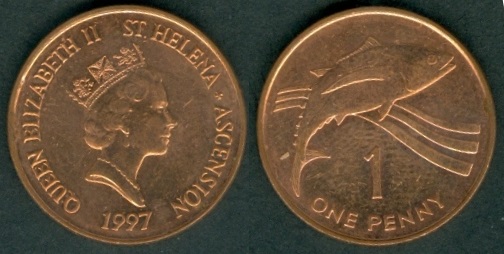 |
KM#13a 1 penny. Year:
1997. Weight:
3.57g [3.56g]. Metal:
Copper plated Steel. Edge:
Plain. Diameter:
20.32 mm.
Alignment:
Medal. Mint:
British Royal Mint.
Obverse:
Queen Elizabeth II portrait facing right in the center. "QUEEN
ELIZABETH II ST. HELENA + ASCENSION" written around her. Year at the
bottom.
Reverse:
Yellow Fin Tuna in the center. Value "1" and "ONE PENNY" at the
bottom.
Mintage:
N/A.
Minted Years: 1997, 2003
and 2006. |
|
Engravers:
Michael Hibbit (value side) and Raphael David Maklouf (Queen Elizabeth
side). |
|
| |
|
1998 |
| |
|
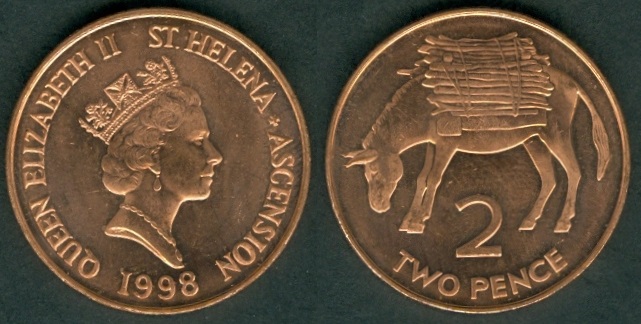 |
KM#12a 2 pence. Year:
1998. Weight:
7.23g [7.13g]. Metal:
Copper plated Steel. Edge:
Plain. Diameter:
25.91 mm.
Alignment:
Medal. Mint:
British Royal Mint.
Obverse:
Queen Elizabeth II portrait facing right in the center. "QUEEN
ELIZABETH II ST. HELENA + ASCENSION" written around her. Year at the
bottom.
Reverse:
Donkey carrying firewood in the center. Value "2" and "TWO PENCE" at
the bottom.
Mintage:
N/A.
Minted Years: 1998, 2003
and 2006. |
|
Engravers:
Michael Hibbit (value side) and Raphael David Maklouf (Queen Elizabeth
side). |
|
 |
KM#22 5 pence. Year:
1998. Weight:
3.25g [3.25g]. Metal:
Copper-Nickel. Edge:
Reeded. Diameter:
18.00 mm.
Alignment:
Medal. Mint:
British Royal Mint.
Obverse:
Queen Elizabeth II portrait facing right in the center. "QUEEN
ELIZABETH II ST. HELENA + ASCENSION" written around her. Year at the
bottom. |
|
Reverse: "JONATHAN THE GIANT TORTOISE" written
at the top. Tortoise in the center. Value "5" and "FIVE PENCE" at
the bottom.
Mintage:
N/A.
Minted Years: 1998, 2003
and 2006. Engravers:
Robert Elderton (value side) and Raphael David Maklouf (Queen Elizabeth
side). |
|
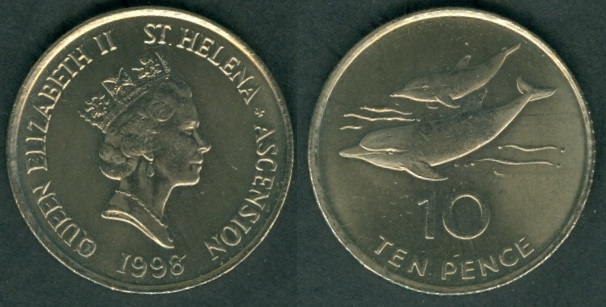 |
KM#23 10 pence. Year:
1998. Weight:
6.58g [6.50g]. Metal:
Copper-Nickel. Edge:
Reeded. Diameter:
24.50 mm.
Alignment:
Medal. Mint:
British Royal Mint.
Obverse:
Queen Elizabeth II portrait facing right in the center. "QUEEN
ELIZABETH II ST. HELENA + ASCENSION" written around her. Year at the
bottom.
Reverse:
Two dolphins in the center. Value "10" and "TEN PENCE" at the bottom.
Mintage:
N/A.
Minted Years: 1998, 2003
and 2006. |
| Engravers:
Robert Elderton (value side) and Raphael David Maklouf (Queen Elizabeth
side). |
|
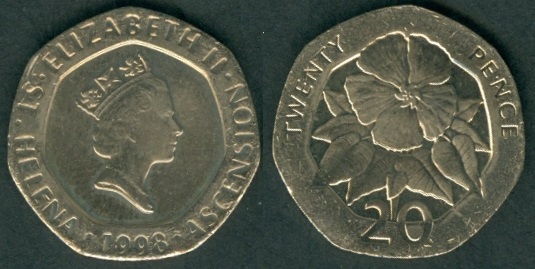 |
KM#21 20 Pence. Year:
1998. Weight:
5.07g [5.00g]. Metal:
Copper-Nickel. Edge:
Plain. Diameter:
21.40 mm; 7-sided (heptagonal).
Alignment:
Medal. Mint:
British Royal Mint.
Obverse:
Queen Elizabeth II portrait facing right in the center. "QUEEN
ELIZABETH II ST. HELENA + ASCENSION" written around her. Year at the
bottom.
Reverse:
"TWENTY PENCE" written at the top. Ebony flower in the center. Value "20"
written at the bottom.
Mintage:
N/A.
Minted Years: 1998, 2003,
2006 and 2015. |
| Engravers:
Robert Elderton (value side) and Raphael David Maklouf (Queen Elizabeth
side). |
|
| |
|
2003 |
| |
|
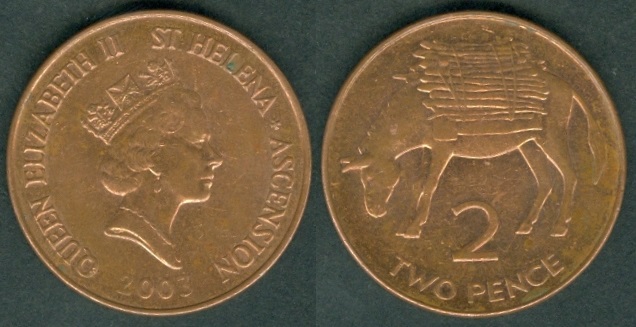 |
Same as KM#12a mentioned above, but... Year:
2003. Weight:
7.15g [7.13g].
Mintage: N/A. |
|
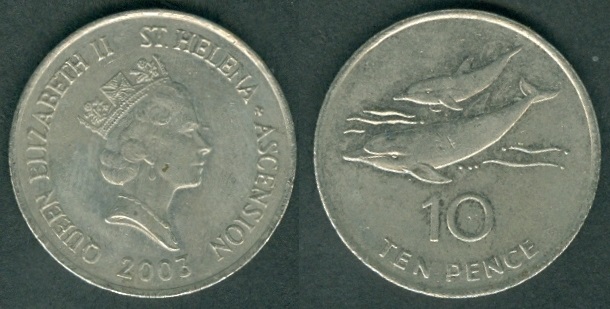 |
Same as KM#23 mentioned above, but... Year:
2003. Weight:
6.55g [6.50g].
Mintage: N/A. |
|
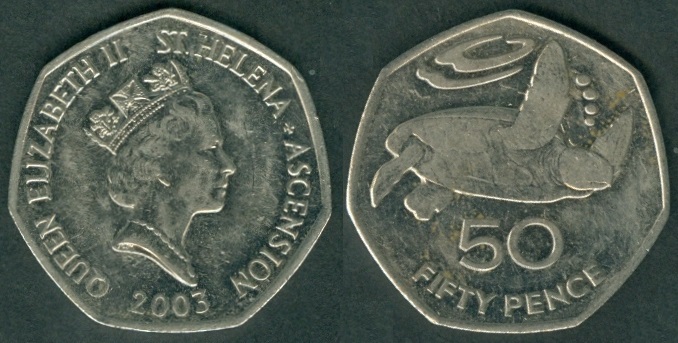 |
KM#27 50 pence. Year:
2003. Weight:
7.94g [8.00g]. Metal:
Copper-Nickel. Edge:
Plain. Diameter:
27.30 mm; 7-sided (heptagonal).
Alignment:
Medal. Mint:
British Royal Mint.
Obverse:
Queen Elizabeth II portrait facing right in the center. "QUEEN
ELIZABETH II ST. HELENA + ASCENSION" written around her. Year at the
bottom. |
|
Reverse: Green Turtle swimming towards right in the center. Value "50"
and "FIFTY PENCE" at the bottom.
Mintage:
N/A.
Minted Years: 2003 and
2006. Engravers:
Michael Hibbit (value side) and Raphael David Maklouf (Queen Elizabeth
side). |
|
 |
Same as KM#17 mentioned above, but... Year:
2003. Weight:
9.51g [9.50g].
Mintage: N/A.
Edge Lettering:
"COLONY OF ST. HELENA". Note:
My coin has edge readable when Date (Queen Elizabeth II) side is on
the top. |
|
| |
|
2006 |
| |
|
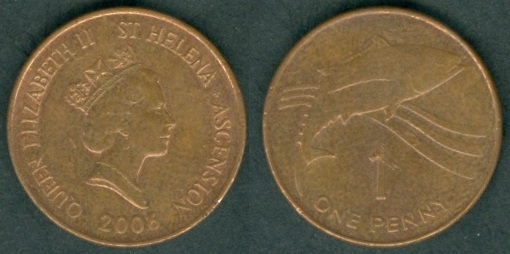 |
Same as KM#13a mentioned above, but... Year:
2006. Weight:
3.52g [3.56g].
Mintage: N/A. |
|
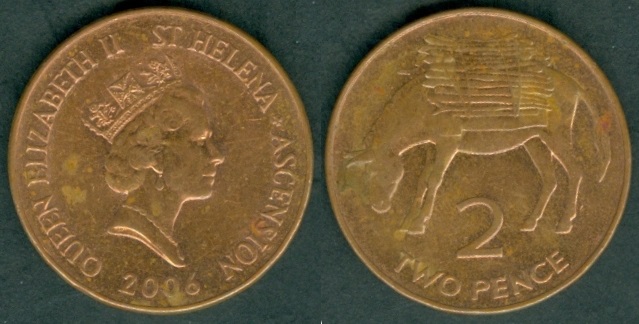 |
Same as KM#12a mentioned above, but... Year:
2006. Weight:
7.15g [7.13g].
Mintage: N/A. |
|
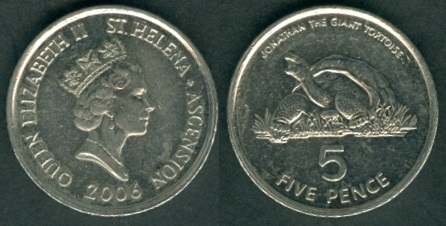 |
Same as KM#22 mentioned above, but... Year:
2006. Weight:
3.30g [3.25g].
Mintage: N/A. |
|
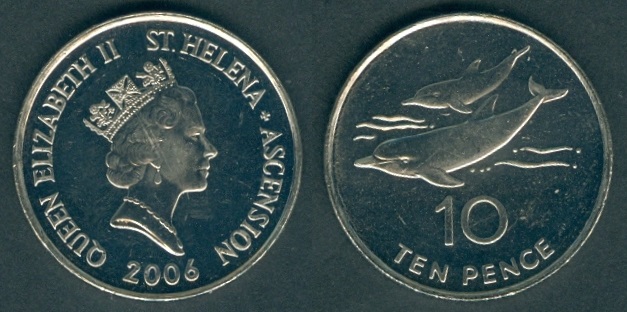 |
Same as KM#23 mentioned above, but... Year:
2006. Weight:
6.59g [6.50g].
Mintage: N/A. |
|
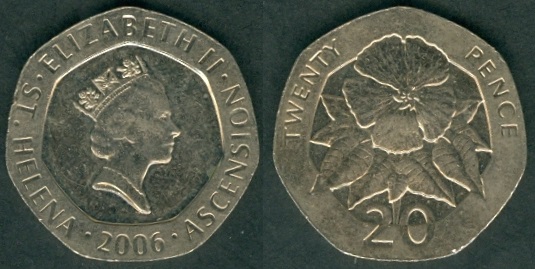 |
Same as KM#21 mentioned above, but... Year:
2006. Weight:
5.02g [5.00g].
Mintage: N/A. |
|
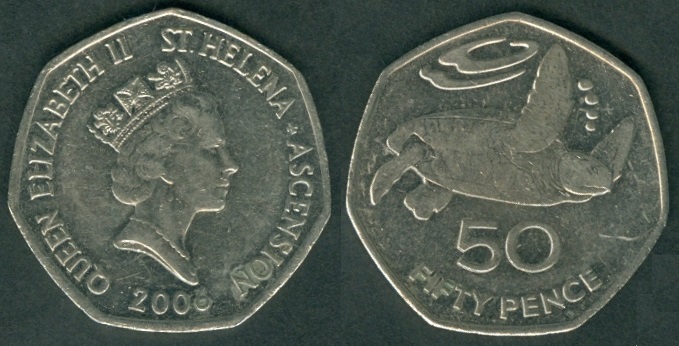 |
Same as KM#27 mentioned above, but... Year:
2006. Weight:
8.10g [8.00g].
Mintage: N/A. |
|
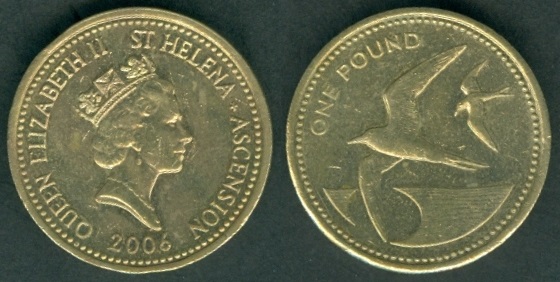 |
Same as KM#17 mentioned above, but... Year:
2006. Weight:
9.64g [9.50g].
Mintage: N/A.
Edge Lettering:
"ST. HELENA ISLAND". Note:
My coin has edge readable when Date (Queen Elizabeth II) side is on
the top. |
|
| |
|
2015 |
| |
|
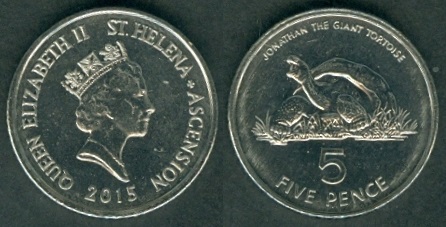 |
KM#22a 5 pence. Year:
2015. Weight:
3.24g [3.25g]. Metal:
Copper
Clad Steel. Edge:
Reeded. Diameter:
18.00 mm.
Alignment:
Medal. Mint:
British Royal Mint.
Obverse:
Queen Elizabeth II portrait facing right in the center. "QUEEN
ELIZABETH II ST. HELENA + ASCENSION" written around her. Year at the
bottom. |
|
Reverse: "JONATHAN THE GIANT TORTOISE" written
at the top. Tortoise in the center. Value "5" and "FIVE PENCE" at
the bottom.
Mintage:
N/A.
Minted Years: One year
type. Engravers:
Robert Elderton (value side) and Raphael David Maklouf (Queen Elizabeth
side). |
|
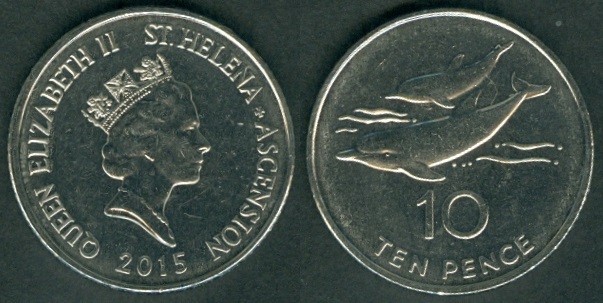 |
KM#23a 10 pence. Year:
2015. Weight:
6.48g [6.50g]. Metal:
Copper
Clad Steel. Edge:
Reeded. Diameter:
24.50 mm.
Alignment:
Medal. Mint:
British Royal Mint.
Obverse:
Queen Elizabeth II portrait facing right in the center. "QUEEN
ELIZABETH II ST. HELENA + ASCENSION" written around her. Year at the
bottom.
Reverse:
Two dolphins in the center. Value "10" and "TEN PENCE" at the bottom.
Mintage:
N/A.
Minted Years: One year
type. |
| Engravers:
Robert Elderton (value side) and Raphael David Maklouf (Queen Elizabeth
side). |
|
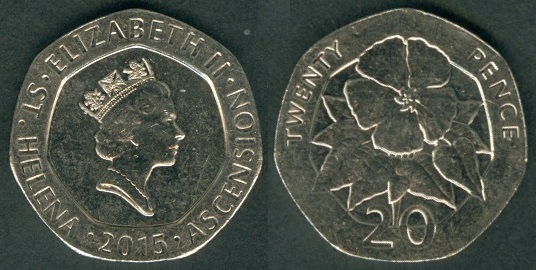 |
Same as KM#21 mentioned above, but... Year:
2015. Weight:
4.96g [5.00g].
Mintage: N/A. |
|
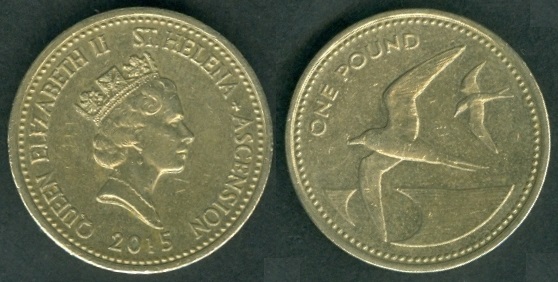 |
Same as KM#17 mentioned above, but... Year:
2015. Weight:
9.52g [9.50g].
Mintage: N/A.
Edge Lettering:
"ST. HELENA ISLAND". Note:
My coin has edge readable when Date (Queen Elizabeth II) side is on
the top. |
|
| |
| |
| |
| |
|
French
Possessions on Saint Helena |
| |
|
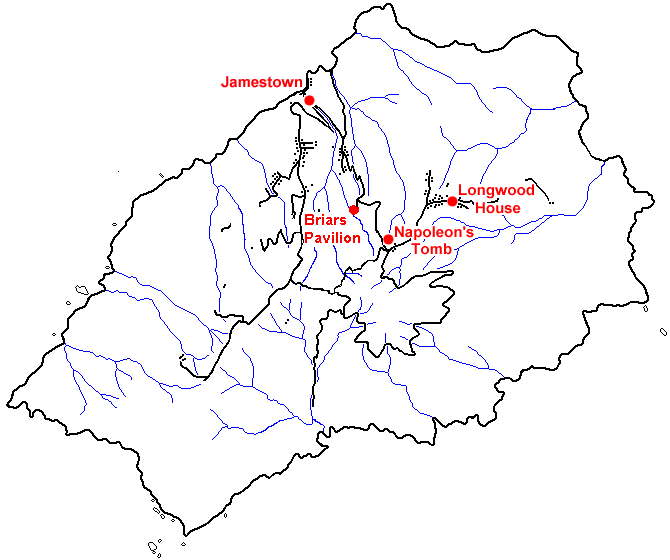 |
| |
18
Mar 1858 British government cedes two sites on Saint Helena related to
the
forced stay of the deposed Emperor Napoléon I on the island -
Longwood House (where he lived) and the Valley of the Tomb
(where his was buried until 1840) - to France as French Possessions
on Saint Helena (Domaines Français de Sainte-Hélène)
(confirmed 07 May 1858).
23 Jun 1940 Administrator loyal to the Free French to 1945.
26 May 1959 Briars Pavilion (where the Emperor spent the first days
of his
stay on the island 17 Oct - 10 Dec 1815) added. |
| |
|
In 1815, the
British government selected Saint Helena as the place of detention of
Napoleon Bonaparte. He was brought to the island in October 1815; he stayed
at the small Briars pavilion in the grounds of the Balcombe family's home
until the building of his permanent home of Longwood was completed, where he
died on 05 May 1821. During this period, Saint Helena remained in the East
India Company’s possession, but the British government met additional costs
arising from guarding Napoleon. The island was strongly garrisoned with
British troops, and naval ships circled the island. In 1858, the French
emperor Napoleon III successfully gained the possession, in the name of the
French government, of Longwood House and the lands around it, last residence
of Napoleon I (who died there in 1821). It is still French property,
administered by a French representative and under the authority of the
French Ministry of Foreign Affairs.
Capital:
Longwood House. |
| |
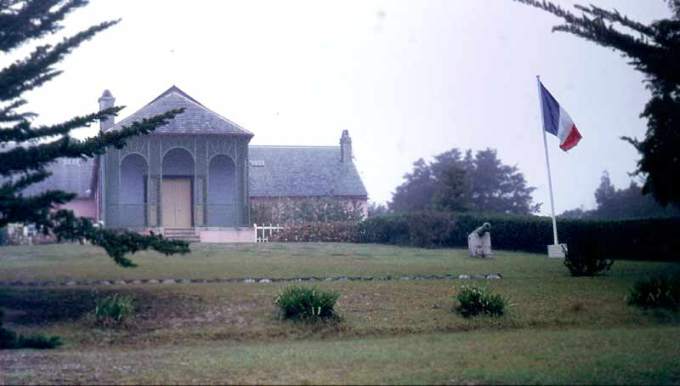 |
| Longwood
House, Saint Helena. Site of Napoleon's captivity 1815-1821. Above photo
taken in June 1970. |
| |
| |
|
|
|
|
|
|
Countries
/ Territories |
| |
|
Chiefa Coins |
|
|










































